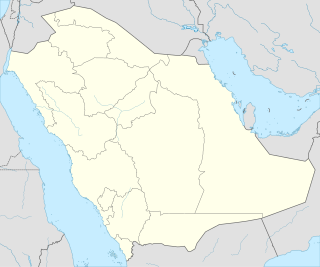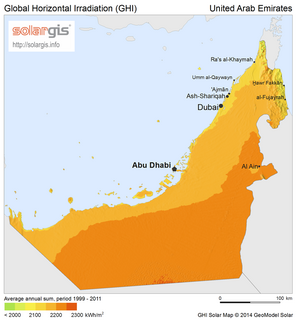
Jizan, also spelled Jazan, Gizan or Gazan, is a port city and the capital of Jizan Region, which lies in the southwest corner of Saudi Arabia and directly north of the border with Yemen. Jazan City is situated on the coast of the Red Sea and serves a large agricultural heartland that has a population of 319,119 as of 2021 and over 1.5 million, within metropolitan area. As the city is the capital of the region, it has the regional airport as well as Jizan seaport. The area is noted for its high-quality production of tropical fruits like mango, figs, and papaya.

Hub Power Company Limited, colloquially known as HUBCO, is the first and largest Pakistani Independent Power Producer (IPP) with a combined installed power generation capacity of 2920 MW. HUBCO is the only power producer in Pakistan with four projects listed in the China-Pakistan Economic Corridor (CPEC), out of which three are under construction — Thar Energy Limited, Thalnova Power Thar (Pvt) Ltd and Sindh Engro Coal Mining Company whereas China Power Hub Generation Company (CPHGC) is already contributing electricity to the national grid.
Malakoff Corporation Berhad ("Malakoff") is an independent water and power producer (“IWPP”) with core focus on power generation, water desalination, operation & maintenance and waste management and environmental services. In Malaysia, Malakoff is the largest independent power producer (“IPP”) with a net generating capacity of 5,822 MW from its six power plants.
Jazan Economic City is an economic city in the Jizan Province of the Kingdom of Saudi Arabia, with a focus on the energy and manufacturing industries. Arab News reported in January 2011 that when the city is completed, an estimated 500,000 new jobs will be created.
Water supply and sanitation in Saudi Arabia is characterized by challenges and achievements. One of the main challenges is water scarcity. In order to overcome water scarcity, substantial investments have been undertaken in seawater desalination, water distribution, sewerage and wastewater treatment. Today about 50% of drinking water comes from desalination, 40% from the mining of non-renewable groundwater and only 10% from surface water in the mountainous southwest of the country. The capital Riyadh, located in the heart of the country, is supplied with desalinated water pumped from the Persian Gulf over a distance of 467 km. Water is provided almost for free to residential users. Despite improvements, service quality remains poor, for example in terms of continuity of supply. Another challenge is weak institutional capacity and governance, reflecting general characteristics of the public sector in Saudi Arabia. Among the achievements is a significant increase in desalination, and in access to water, the expansion of wastewater treatment, as well as the use of treated effluent for the irrigation of urban green spaces, and for agriculture.
The Shoaiba power and desalination plant is an oil-fired CCGT power and desalination complex in Saudi Arabia on the coast of Red Sea, about 120 kilometres (75 mi) south of Jeddah. It is one of the world's largest fossil fuel power plants, and the world's third largest integrated water and power plant.
Fujairah F1 Independent Water and Power Plant or Fujairah F1 IWPP is a hybrid plant at Qidfa', Fujairah in the United Arab Emirates. It is located next to the Qidfa Power Station 5 kilometres (3.1 mi) south of Khor Fakkan and 20 kilometres (12 mi) north of the city of Fujairah. When constructed, the Fujairah plant was the first hybrid plant in the Middle East, and the largest desalination hybrid plant in the world.
The Fujairah F2 IWPP is an integrated water and power plant (IWPP) project in Fujairah, the United Arab Emirates. When construction is finished, it will be the world's second largest IWPP project.
Energy in Sudan describes energy and electricity production, consumption and imports in Sudan. The chief sources of energy in 2010 were wood and charcoal, hydroelectric power, and oil. Sudan is a net energy exporter. Primary energy use in Sudan was 179 TWh and 4 TWh per million persons in 2008.

Solar power in South Africa includes photovoltaics (PV) as well as concentrated solar power (CSP). In 2016, South Africa had 1,329 MW of installed solar power capacity. Installed capacity is expected to reach 8,400 MW by 2030.

Solar power in Morocco is enabled by the country having one of the highest rates of solar insolation among other countries— about 3,000 hours per year of sunshine but up to 3,600 hours in the desert. Morocco has launched one of the world’s largest solar energy projects costing an estimated $9 billion. The aim of the project is to create 2,000 megawatts of solar generation capacity by the year 2020. Five solar power stations are to be constructed, including both photovoltaic and concentrated solar power technology. The Moroccan Agency for Solar Energy (MASEN), a public-private venture, has been established to lead the project. The first plant will be commissioned in 2015, and the entire project in 2020. Once completed, the solar project will provide 38% of Morocco’s annual electricity generation.

ACWA Power is a developer, investor, co-owner and operator of a portfolio of power generation and desalinated water production plants currently with presence in 10 countries including in the Middle East and North Africa, Southern Africa and South East Asia regions. ACWA Power’s portfolio, with an investment value in excess of USD 33 billion, can generate more than 22 GW of power and produce 2.5 million m3/day of desalinated water to be delivered on a bulk basis to state utilities and industrial majors on long term off-take contracts under Public-Private-Partnership, Concession and Utility Services Outsourcing models (BOO/BOOT).
Qurayyah IPP (QIPP) is a large gas fired combined cycle power station in Qurayyah, Saudi Arabia.
Rabigh 2 IPP (R2IPP) is a Combined Cycle Power Station project under construction on the western coast of Saudi Arabia, 150 km north of Jeddah. R2IPP will have an installed electrical generating capacity of 2,060 megawatts to supply Makkah Province with electric power. The project will deliver electricity to Saudi Electricity Company under the Power Purchase Agreement which has a term of 20 years from the scheduled commercial operations date of June 2020.
Bokpoort CSP is a concentrated solar power (CSP) thermal energy power plant, located near Groblershoop in the Northern Cape province of South Africa. The project was procured pursuant to the Renewable Energy Independent Power Producer Procurement (REIPPP) program initiated by the South African Department of Energy.

Solar power in the United Arab Emirates has the potential to provide most of the country's electricity demand. While being a major oil producing country, the United Arab Emirates (UAE) has taken steps to introduce solar power on a large scale. However, solar power still accounts for a small share of energy production in the country. The country was the 6th top carbon dioxide emitter per capita in the world in 2009, with 40.31 tonnes, but is planning to generate half of its electrical energy by 2050 from solar and nuclear sources, targeting 44% renewables, 38% gas, 12% coal, and 6% nuclear energy sources.

Mohammed bin Rashid Al Maktoum Solar Park is a solar park spread over a total area of 77 km2 in Saih Al-Dahal, about 50 kilometers south of the city of Dubai. The plant was implemented by the Dubai Electricity and Water Authority (DEWA). The first phase of the project was commissioned on 22 October 2013.
There are approximately 16,000 operational desalination plants, located across 177 countries, which generate an estimated 95 million m3/day of freshwater. Micro desalination plants operate near almost every natural gas or fracking facility in the United States. Furthermore, micro desalination facilities exist in textile, leather, food industries, etc.
The Ras Al-Khair Power and Desalination Plant is a power and desalination plant located in Ras Al-Khair on the eastern coast of Saudi Arabia. It is operated by the Saline Water Conversion Corporation of Saudi Arabia. The plant began operating in April 2014 and, as of January 2017, is the world's largest hybrid water desalination plant. The project includes a power plant capable of producing 2400 MW of electricity. In 2015, it won the Global Water Awards "Desalination Plant of the Year" award.







